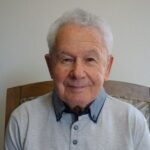
Rudolf Ayzenshtok, z"l (Ukraine)
I was born in Dnepropetrovsk, Ukraine. My mother Zinaida was a house wife and my father Israel was the Chief Engineer at a military factory in Dnepropetrovsk.
The war started June 22, 1941, and Dnepropetrovsk was bombed right away.[1] Every time the air raid alert sounded (the sirens were so loud) we would run to a bomb shelter. My parents invited another family to live with us after their house was destroyed in the bombings. Soon, our family decided we had to leave Dnepropetrovsk as soon as we could. There were six of us in all: my grandmother, mother, my oldest sisters Lidiya and Olga, my twin brother Mikhail and me. We left Dnepropetrovsk on a cart pulled by two horses.
There were many other people (refugees) leaving the city along with us. We walked on the streets and often heard the military yell, “Clear the road! Clear the road!” Everyone would run from the road to let them get through.
At one point, as we were walking, we saw saw military officers riding on horses and realized my father was among them. He had to remain behind even as we continued, since high rank engineers could not leave the factory at that time. My father was wearing white shoes, white pants and a white shirt. As we departed Dnepropetrovsk, my mother asked my father what she should take for us to wear. I was very young then, but still remember what my father said very well: “Pack something, maybe light coats, you will be back soon, and leave my suitcase here in the apartment.” My father did not get a chance to go back for his suitcase and uniform because the Germans were already entering Dnepropetrovsk. We were very excited to reconnect with my father when we saw him on that horse. We started shouting, “Papa! Papa!” We were reunited.
We arrived to Slovyansk, Ukraine, where my mother’s brother lived. We stayed with him for a little while, but had to continue our travels, though my grandmother decided to remain in Slovyansk. When we were leaving she said that she was too old to travel and wanted to stay. They all died there in Slovyansk, killed by Germans.
When we got to the railroad station the train we were supposed to be on had already left. That train also transported equipment from evacuating factories.[2] My father found out later that that train was bombed by the Germans. We survived purely by luck.
As Chief Engineer at his factory, my father’s assignment was to relocate the operation at another factory located in Central Asia. I don’t remember the exact name of the town, but it was near Tashkent, Uzbekistan. My father worked there as Chief Engineer for a short period before he was reassigned to a different factory, this one in Tashino, which is in Russia’s Gorky region. It was later renamed Pervomaysk. My mother, brother, two sisters and I followed him there. This particular town was never published on maps because if was one of the nuclear center’s of Russia. My father eventually worked as the Chief Engineer at one of the nuclear facilities. In addition to Soviet prisoners of war, only German and Japanese workers worked there.
I was eight years old and was going to school. We didn’t have notebooks so we created our own by cutting out pages of newspaper and writing between the lines of typed text. As Chief Engineer, my father received a food ration, but only for one person. We would often come to the factory to take his ration and that was the only family meal we had. We were always hungry. Ours was one of eight families living in a house made from logs. Finally, my father was able to get an apartment for us. Our family lived in one half of the apartment and the factory director lived in the other half.
In 1947, my father had a stroke and became very ill. He couldn’t hold the position of Chief Engineer anymore, so we quickly ran out of money and had no other sources of income. We moved to a town called Kremenchug, Ukraine, where he was able to get a job as head mechanic at a local factory; however, he couldn’t work long, so he retired.
After I completed the seventh grade I attended Vocational School, and when I was 18 I graduated from Mechanical-Engineering College. I became a specialist in developing tanks. I was assigned to work in a tank factory in Bryansk, and then I was drafted into the navy. I served in the navy four years. Following naval service, I was accepted to go to the Kharkov Polytechnic Institute. After I graduated, I became Chief of the Design Bureau for a car factory. I met my future wife Lidiya there, and in 1958 we were married in Kremenchug. My wife was twenty years old and I was twenty-four. She worked as a Nurse Practitioner. Lidiya and I have two sons: Stanislav and Valeriy. We moved to United States at the end of 1999.
[1] World War II came to the Soviet Union on June 22, 1941, when the Germans initiated Operation Barbarossa, an all-out invasion of the Soviet Union. This was the largest military operation undertaken by the Germans during the war.
[2] The Soviets evacuated entire factories (equipment and workers) to the relative safety afforded them in eastern areas. The evacuations were conducted via rail lines while the Germans advanced. Relocated factories formed the core of Soviet war production effort in WWII.
